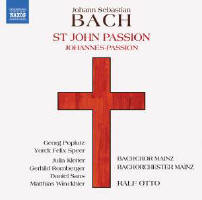Texte paru dans: / Appeared in: |
|
|
Outil de traduction (Très approximatif) |
|
|
Reviewer:
Peter Quantrill Having the one-to-apart Scholars Baroque Ensemble and the allmale cathedral forces of Oxford’s New College in its catalogue, Naxos has chosen shrewdly in expanding its range of St John Passion recordings to a trio with an all-German, full-bodied choral performance, recorded under studio conditions but heightened by plenty of live atmosphere. Some open intonation from the keening oboes draws attention to itself in the opening chorus, though their every deviance from well-tempered tuning is exaggerated by a front-loaded recording balance which places obbligato instruments on at least an equal footing with the vocal soloists and privileges theorbo and harpsichord in a continuo section discreetly buttressed by a chamber organ. The chorus is duly recessed; an obstacle to prominence they surmount with exact articulation and impressive dynamic control. Even so, should you really be able to hear every semiquaver of the theorbo in the climactic turba counterpoint of ‘Lasset uns der nicht zerteilen’? And do you want to? Ralf Otto’s direction of his 60‑strong choir and period ensemble is never short on rhythmic impetus, though he goes his own way in pointing the chorales, elongating some pause marks while sailing over others, and he does like a spaciously marked cadence. Native and forthright feeling for the poetry offers partial compensation for a rather blankly rhetorical delivery of the recitatives: there’s nothing vocally to object to in Georg Poplutz’s Evangelist or the Christus of Yorck Felix Speer, but they never challenge the fourth wall in the manner of Schreier or Padmore, McDaniel or Quasthoff. Such modulated restraint infuses the arias so that the narrative never wanders as it can in the sequence of expanding arias on more starrily soloistic recordings. The tenor of Daniel Sans is projected with more verbal acuity than vocal weight, which does not lend appeal or staying power to ‘Erwäge’ or indeed to the two long and virtuoso arias in the appendix of items which Bach composed for his 1725 revision. I will return to this newcomer for the reassuring polish and dignity of Gerhild Romberger in ‘Von den Stricken’ and ‘Es ist vollbracht’, but for little else. |
|




